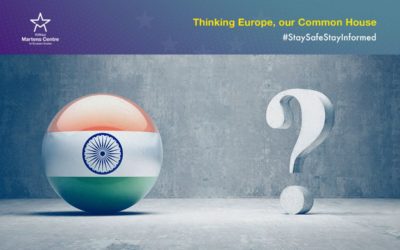 Loading...
Loading...-
970 million voters across 100 000 polling stations over 6 weeks of voting – the 2024 Indian elections operate at a scale beyond imaginable when it comes to democratic elections, dwarfing the no less important US and European elections. These elections across three different continents all mark decisive crossroads for their polities, which might shape not only their own destinies, but also the path of the future global order. India, which proudly calls itself the world’s largest democracy, sits at many crossroads – both domestically and as a rising power pole in a turbulent world.
With Narendra Modi and his BJP having won elections for a third consecutive time, yet with a smaller majority than expected, we will not see a new India, as BJP propaganda ceaselessly claims, but rather a continuation of existing policies.
However, the new European Commission will need to go back to the drawing board and adjust its strategic outreach to India as relations between the Asian country and the EU had developed rather sluggishly since the 2020 EU-India Strategic Partnership. The relationship took a heavy blow after the Russian war on Ukraine and India’s reaction of emphasising its own geostrategic objectives, including maintaining close relations with Russia. It didn’t, as some in Europe naively thought, quickly join the “Western alliance” against Russia – with Foreign Minister Subrahmanyam Jaishankar saying “Europe has to grow out of the mindset that Europe’s problems are the world’s problems, but the world’s problems are not Europe’s problems.”.
That gives Europe a taste of the challenges ahead for future EU-India relations and can be seen as a testing ground for any future EU relations with emerging powers, beyond China. Breaking out of this repeating cycle of over-expectations and disappointments on the European side in relation to India requires a much better understanding of the internal dynamics of Indian policy, which is driven by the need for development and balancing the rising power of China in the Indo-Pacific sphere.
The case for better EU-India relations is far from lost. Indians are well aware that Europe is an indispensable partner if India wants to succeed in its modernisation and become a relevant player in global affairs. This is because India’s needs go beyond a large population and a rapidly growing economy, despite what some self-confident Indian political leaders would have us all believe.
As a breeding ground for innovation, Europe is – next to the United States – the place to be. A different quality of growth is what both continents seek to achieve. Educational exchange and matching labour demand to labour supply can be improved, for which Europe must tear down some obstacles and cultural prejudice. In India, rapid progress in energy transformation coupled with sustainable urbanisation will be crucial development factors for the country’s future. Even when it comes to coping with fast and ground-breaking demographic changes, as different as the situation between a young India and an ageing Europe may seem at first, best practices can be shared between the two partners.
A field of huge potential, but also of occasional despair, is the painstaking field of trade. Next to Mercosur, not having concluded a EU-India Free Trade Agreement over the last twenty years is a shameful point in bilateral relations. The European Union must critically revise its current approach, which has left the Union out of the dynamics of global trade integration, which is still happening despite debates around decoupling and de-risking. The latter would be an even stronger incentive to better exploit potential market opportunities. Economic security has become a focal point of Indian and European policies – with the caveat that it should not lead to a new round of protectionism, in which both partners shoulder some blame, even now. The realm of digitalisation and health is marked as a key unionised area of competence by the European Commission. Here, India deserves that more efforts be made to join hands, both in research and standards.
And there remains the field of hard power. As Europe steps up its effort to take more of its security in its own hands, new fields of cooperation emerge. India and the European Union as regional powers bear an increasing responsibility for the stability of their neighbourhood. And these areas are merging into each other, e.g., in the vast area around the Arabian Peninsula and East Africa. Maritime security and the fight against terrorism have already become a growing area of joint initiatives.
Europe should not shy away from remaining a critical partner to India, even if it will receive some predictably harsh reactions from its political elite and accusations of double standards. Concerns about weakening democratic institutions in India are well-grounded, as are warnings against rising Hindu nationalism which would destroy the complex fabric of Indian society. Parts of India’s elite are jealously – and anxiously – looking at the rise of its big neighbour China and put development above everything. Europe should present itself to India as a different example of a power and success model, making the most of its diversity, while not giving up its identity.
Peter Hefele Democracy Foreign Policy India

Peter Hefele
EU-India Relations: What Next After the 2024 Elections?
Blog
07 Jun 2024
-
The EU is right to boost its relationship with India, who might be the world’s strongest economic power by the end of the century. However, many hurdles remain for India to take on a leading global role.
With the Western world struggling with the COVID-19 pandemic and China strengthening its position, bolstered by a good management of the epidemic, there is a temptation to view the world’s geopolitical future as a game of three players: the United States, China, and the European Union. However, it is clear that in future decades, other continents and countries will increase their role. India especially has the potential to change the global balance in the coming decades.
The ongoing Portuguese EU Council Presidency has set out a priority to enhance EU-India relations, and for good reasons. While India remains in many respects a developing country, it has great potential. Importantly, a strong India can have a stabilising impact in Asia, especially vis-à-vis China. For the West, India’s main attraction comes from its potential future role in the global economy.
For the EU, India can offer great economic opportunities. India has an increasing interest in finding global allies, not least because of China.
While India is fully conscious that China has, for decades, overtaken India in economic and technological development, India has done very well from a global perspective. Though China’s advantage over India is still increasing in many fields, there are factors that strongly play in India’s favour.
India’s advantages over China
Firstly, contrarily to China, India has demographic development on its side. China will peak just below 1.5 billion people in the next decade, before decreasing to 1.3 billion people by 2050. As a result of this development, China’s dependency ratio will challenge the country’s development, similarly to what we’ve seen in Europe and the West more generally. In opposition to this, by 2050, India will be home to an estimated 1.7 billion people, and its dependency ratio is actually declining. While India will remain young, China will become old. Secondly, while India’s infrastructure is much weaker, its potential for growth is greater as a result. Thirdly, despite its political problems, India is a democratic nation, and fostering relationships with the US and Europe will be much easier.
India, however, must deal with several hurdles before truly becoming a global player. India’s domestic political developments are worrying. India’s Prime Minister Narendra Modi overwhelmingly won the May 2019 elections, ensuring control over the country’s future. Modi has been accused of boosting his popularity by implementing Hindu nationalist policies in a multireligious and multicultural country, which already has a history of ethnic conflicts. Moreover, his illiberal inclinations are concerning. Political instability in spite of Modi’s rule is a factor of Indian politics, directing the policy focus inwards.
At the same time, his nationalistic attitude is reflected in India’s approach to foreign relations, and in global governance and the development of global trade. India has high tariffs and a strongly nationalistic industrialisation strategy, and trade negotiations between the EU and India have been delayed several times.
India’s foreign policy has a strong focus on neighbouring countries, especially on China’s rise. Furthermore, India is in many ways still a developing country, with undeniable potential, but far behind China. The demographic advantage India will hold in the future will also serve as a challenge with the increasing environmental problems and pressure on basic infrastructure and agriculture. China’s influence concerns India, limits its agenda, and has a strong impact on India’s self-confidence as a global player.
For the EU, India can offer great economic opportunities. India has an increasing interest in finding global allies, not least because of China. The EU and India have already set a pragmatic agenda to boost EU-India relations in their roadmap to 2025. While India’s future global role is unclear, both the EU and its individual member states have a lot to gain in enhancing cooperation with India and moving Indian relations higher in their political agenda. India might be, in future decades, the “next big thing” after China. Europeans should be ready for it.
Tomi Huhtanen China Foreign Policy India Leadership

Tomi Huhtanen
While the EU searches for a stronger partnership, India’s future global role remains unclear
Blog
27 Jan 2021


